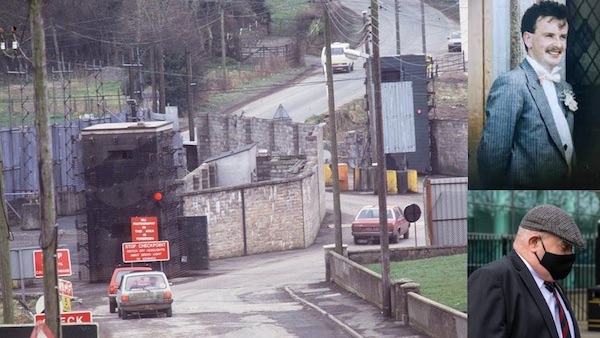
A trial in Belfast of a former British soldier has heard that his claim that his finger “slipped” when he killed 23-year-old nationalist Aidan McAnespie at a border checkpoint was “not credible”.
Mr McAnespie, from Aughnacloy, County Tyrone, was on his way to a local Gaelic sports club when he was shot in the back in February 1988.
David Holden (pictured, bottom right), aged 52, is on trial at Belfast Crown Court accused of the manslaughter of Mr McAnespie (pictured, top right). Mr McAnespie was shot down moments after he walked through Holden’s checkpoint where he was identified as a “person of interest” (a suspected IRA member or supporter).
Opening the trial, prosecuting barrister Ciaran Murphy QC said: “On Sunday February 21 1988 Aidan McAnespie was killed by one of three bullets fired from a general purpose machine gun, also known as a GPMG.
“The gun was mounted in the army sangar situated at a permanent vehicle checkpoint in Aughnacloy, about 1km on the Northern Ireland side of the border.
“The defendant fired the gun resulting in the death of Mr McAnespie.”
He said the explanation given for the shooting by the defendant at the time was that his finger had slipped on to, and pulled, the trigger by accident.
“That explanation is not accepted by the prosecution.
“Although even if that version is accepted as fact, we say it was nevertheless a grossly negligent act and we submit that the court conclude that the defendant failed to give adequate regard as to whether the gun was in a non-firing state when he pulled the trigger.
“Given the level of duty of care upon the defendant as a soldier in possession of a deadly and lethal weapon in those circumstances, we say the killing of Mr McAnespie was an unlawful act.”
Mr Murphy told the trial that in the moments before the shooting, a colleague of Holden’s had told him that Mr McAnespie was making his way across the border.
He added: “That was the trigger for Mr Holden to direct his attention towards Mr McAnespie.
“During his interview with police the defendant accepted he took an interest in the deceased as he had previously been advised he may be a person of interest.
“A short time later there was a burst of fire from the machine gun while being controlled by the defendant.”
The barrister said Holden’s account that he had fired the weapon by accident because his hands were wet was “not credible”.
“The fact that two of the three shots fired landed within yards of Mr McAnespie, someone whom the defendant accepted he was interested in and concerned he was a member of the IRA, support the inference that the defendant was training his gun in the region of the deceased at the time he engaged the trigger.”
The trial was told that six days before the shooting, Mr Holden had received a grading of “skilled” in the use of the weapon. When asked by a senior British Army officer what happened, Holden admitted he had “squeezed the trigger”.
The court was also told that to fire the gun would at least require 9lb of pressure to be applied to the trigger and that “force is required”.
In 2017, further forensic tests were carried out using a similar weapon to test the viability of defendant’s account. It found that it was highly unlikely and that Holden’s account was not “credible and unrealistic”.
After a justice campaign of over 34 years, members of his family finally saw the accused in court on Monday. His is one of only a tiny number of prosecutions of killer British soldiers to go to trial throughout the history of the conflict. In recent months, several have collapsed for a variety of legal and medical reasons.
The British government announced last year that it is planning legislation to bring a permanent end to conflict-related prosecutions and civil proceedings.
Members of Mr McAnespie’s family, supported by Amnesty, said that there should be not be an end to conflict prosecutions. Speaking outside court, Grainne Teggart from Amnesty said: “Today represents the due process that the UK Government is seeking to shut down for victims.
“Their plans to legislate for an effective amnesty would permanently deny justice to other victims.
“It is imperative that the UK Government heed the opposition to those proposals.”
Mr McAnespie’s cousin Brian Gormley said: “What we expect from a democracy is that the justice system delivers for people.
“We think that everyone should be entitled to that.”
![[Irish Republican News]](https://republican-news.org/graphics/title_gifs/rn.gif)
![[Irish Republican News]](https://republican-news.org/graphics/title_gifs/harp.gif)

